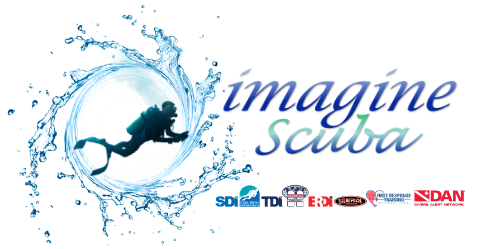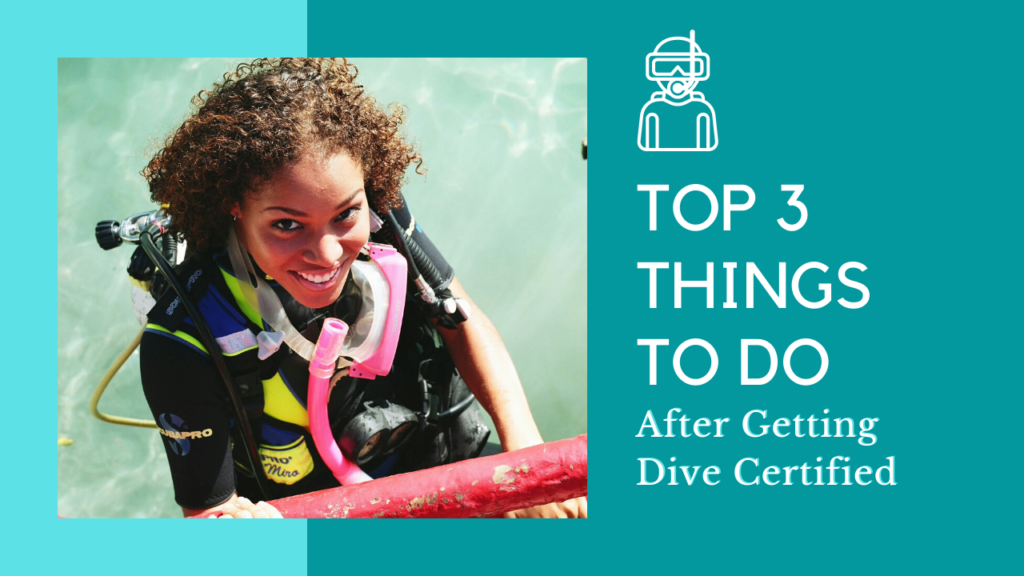As a newly certified Open Water diver, figuring out the next step may seem a bit daunting or overwhelming. You just finished your class, which by no means is an easy feat. You learned concepts that are meant to help ease you into a completely new, underwater world. You also learned important skills that are absolutely essential to keeping you safe. Now, here you are, with a new scuba certification. What comes next? In my experience, there are 3 major actions that a newly-certified Open Water Diver should take in order to make the most of their certification and continue this new life below the waves.
1. Dive, Dive, Dive!
This may seem like a no-brainer, but before diving right into another certification, it’s essential to gain more diving experience and with it, comfort underwater. In my case, because of time constraints due to an upcoming internship to study whale sharks, I obtained two certifications in four days. These certifications amounted to an overload of information, and it was hard for me to take it in all at once and in such a short amount of time. Due to this time crunch, I found I missed or forgot bits and pieces of essential information and skills, making diving far more difficult and frustrating than it needed to be. Although I was eventually able to adapt and develop my newly learned scuba skills, I highly recommend spending time in the water before hopping right into the next certification class.
After getting your open water certification, find opportunities to practice and gain more experience in the water. Sign up for some dives with the facility you were certified with or nearby scuba shops. Hone your skills and become a more developed diver. You might make some lifelong friends along the way. Know that even though the Open Water certification is the “beginner cert,” you will still have the opportunity to experience some amazing dives!
2. Further Your Dive Education!
You’ve gotten more comfortable in the water and feel like your skills and experience have prepared you for the next step. You’re prepped and ready to jump right into the next thing. What should you do now? Expand your dive knowledge and move on to the next certification! It’s time to find your local dive shop or dive center and fine-tune your basic skills and learn some new ones!
An extremely helpful resource for mapping out all the possible directions to take your dive training is our SDI Course flowchart. This can be found under TDISDI’s “Courses” drop-down, labeled “View All Scuba Diver Courses.” Maybe you want to take a range of fun specialty courses, such as wreck diving, night diving, or computer nitrox diving. Or maybe you’d prefer to begin the path to becoming a Divemaster or Instructor. You could even explore entirely different diving careers such as becoming a PFI Freediver or a TDI or ERDI diver.
3. Find Your Passion In Diving!
Pursuing your dive education and finding your passion for diving go hand in hand. Once you know you’re ready to begin, you may want to ask yourself, “what am I passionate about in diving?” This is an important consideration when deciding which class to pursue. Since I graduated from college with a degree in Environmental Science, I knew I wanted to fine tune my scuba skills and focus my training on marine ecosystems. In this sense, knowing what you want to do with your dive training can help you narrow down the next step you should take.
But, what if you don’t know exactly what path you want to follow? If you are not quite sure which step you want to take, an all-around great option after achieving your Open Water certification is the SDI Computer Nitrox class. This certification does not require you to complete any additional dives and can be done just by completing an online eLearning class and a short practical with an instructor. In this course, you will learn about the benefits of breathing different gas mixtures and how to safely use nitrox with a dive computer. The biggest take away you’ll get from this course is learning about the benefits of using nitrox and how it can provide you with increased safety margins, reduced post dive fatigue, and extended no-decompression dives.
You may also want to opt for the Advanced Adventure Diver course, which is one of the best certifications to achieve after your Open Water training. This course offers an amazing opportunity to learn more important diving skills and fine tune those you’ve already learned. It also gives you the chance to choose three elective specialty courses to try out (as a side note, I highly recommend the Advanced Buoyancy control elective specialty dive. It is incredibly rewarding and it greatly enhanced the feeling of control I have in the water.) The Advanced Adventure Diver course will also require you to learn more about navigational diving as well as deep diving. One of the biggest benefits to doing this Advanced Adventure course is after you’ve completed this certification, you may have found your passion in one of the elective specialties from you’ve chosen. Additionally, the dives you completed while obtaining your Advanced Adventure certification can count towards the full certification of that specialty!
There are many options and pathways that you can take after completing your Open Water Certification. But don’t let the thrill of obtaining your cert pressure you to jump straight into the next one right away. Hone your skills, get some dives under your belt, and recognize what it is you want to gain out of diving. Apply those desires and take some classes! Based upon your personal passions, you can map out a path that is suited perfectly for you and your growing diving career.
By Viviana Marcy

